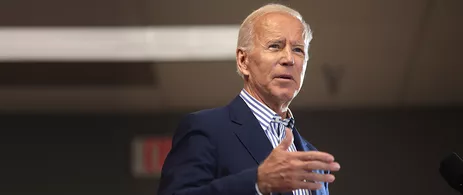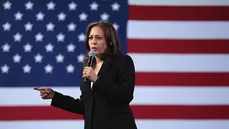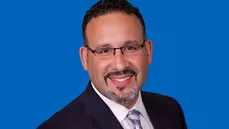
With the election of Joseph R. Biden, Jr. and Kamala Harris as the 46th President and Vice President of the United States, there is a sense of relief and renewed optimism in the higher education and entrepreneurial communities worldwide. Unlike the previous administration, Biden and Harris have fully embraced science and evidence-based decision-making. Their primary goal in this regard will now be to restore the U.S. reputation as a leader in science, technology, and entrepreneurship.
In a memorandum released by the White House on January 27, 2021, President Biden announced his administration’s commitment to “restore trust in government through scientific integrity and evidence-based policymaking.” Scientific and higher education communities around the world received the statement with relief. For them, it had sometimes been unnerving that Biden's predecessor consistently ignored science, interfered with scientific research, and refused to consider objective evidence when it conflicted with his political agenda.

Science first
With Mr. Biden’s announcement, however, it seems that this may now change for the better. By far the most encouraging sign was the elevation of the Director of the Office of Science and Technology Policy to the cabinet level – a historical first. Equally encouraging is the memorandum’s clear directive to establish policies against improper political influence on the scientific process or the suppression or distortion of scientific findings.
In elevating the role of Science Advisor into the cabinet level, Mr. Biden specifically stated:
The Director of the Office of Science and Technology Policy (…) shall ensure the highest level of integrity in all aspects of executive branch involvement with scientific and technological processes. This responsibility shall include ensuring that executive departments and agencies (…) establish and enforce scientific-integrity policies that ban improper political interference in the conduct of scientific research and in the collection of scientific or technological data, and that prevent the suppression or distortion of scientific or technological findings, data, information, conclusions, or technical results.
This policy, applicable to all executive branch agencies, takes effect immediately and will help to reassure the international scientific and higher education communities.
Credible science and technology policy
The policy announcement is not just rhetoric, either. The new Director will be supported by an interagency task force of the National Science and Technology Council (NTSC), which will monitor and report on the various government agencies’ compliance with this policy. The new President is truly serious about putting science first, and his choice of science advisor seems to be a solid one.

Dr. Eric S. Lander is Professor of Biology at the Massachusetts Institute of Technology, Professor of Systems Biology at Harvard Medical School, and a Founding Director of the Broad Institute of MIT and Harvard. He is perhaps best known for his co-leadership, together with Dr. Francis S. Collins, of the Human Genome Project, in which the DNA sequence of the human genome was determined. The scientific community has welcomed this appointment with great enthusiasm.
Climate change is the focus
Further cementing his commitment to science and evidenced-based policymaking, President Biden issued another Executive Order on January 27, 2021 returning the United States to its leadership role on the climate crisis. He stated, “Domestic action must go hand in hand with United States international leadership, aimed at significantly enhancing global action. Together, we must listen to science and meet the moment.” The most visible symbols of this commitment are President Biden’s return to the Paris Climate Accords and the immediate revocation of the Keystone XL Pipeline permit.
In a January 20, 2021 Order revoking the permit, the President stated:
It is, therefore, the policy of my Administration to listen to science; to improve public health and protect our environment; to ensure access to clean air and water; to limit exposure to dangerous chemicals and pesticides; to hold polluters accountable, including those who disproportionately harm communities of color and low-income communities; to reduce greenhouse gas emissions; to bolster resilience to the impacts of climate change; to restore and expand our national treasures and monuments; and to prioritize both environmental justice and the creation of well-paying union jobs necessary to deliver on these goals.
While it is abundantly clear that President Biden understands the need to base policy on science and the evidence it provides, there remains some uncertainty about what his new administration will mean for the international higher education and entrepreneurial communities.
Outlook for higher education still unclear
When it comes to the outlook for higher education, many questions remain unanswered. Will tuition at four-year colleges be free? Will student loans be forgiven? Will DACA (Deferred Action for Childhood Arrivals) students be allowed to stay? How will the visa programs for foreign students and graduates change? The answers to these and many other questions will depend on whether Mr. Biden can get legislation through Congress, where his Democratic Party effectively holds a slim majority in both chambers, but nothing is certain.

His appointee for Secretary of Education, Miguel Cardona, appeared before the Senate Health, Education, Labor, and Pension committee on February 3. Dr. Cardona has a lifetime of work in all educational levels behind him, having served as elementary school teacher, principal, adjunct professor, and assistant superintendent. He comes to the Biden administration from his most recent post as Connecticut’s Education Commissioner. At his hearing, Dr. Cardona outlined his plans for K-12 education in great detail but provided little information on his plans for higher education. Nevertheless, he did express support for addressing the student loan crisis, possibly even through debt forgiveness.
Both Republican and Democratic Senators stated that Dr. Cardona is “eminently qualified” to serve as Secretary of Education, and his confirmation looks almost certain. The full Senate is expected to vote on his nomination shortly. As more information about the Biden Administration’s approach to higher education and what it might mean to the TUM community becomes clear, we will update this story as necessary.
Reason to be hopeful
While it is still early days, the new President’s embrace of science and evidence-based policymaking, together with his solid choice for Secretary of Education, bodes well for the future of international research, education and entrepreneurship.
Sources
- Science | Business: Biden puts science at the top of his agenda
- Science Mag: Biden orders sweeping review of government science integrity policies
- Whitehouse: Memorandum on Restoring Trust in Government Through Scientific Integrity and Evidence-Based Policymaking
- Geneng news: Science Takes Center Stage in the Biden Administration
- Inside higher ed: Biden presidency offers promise of reset for international education, but challenges remain